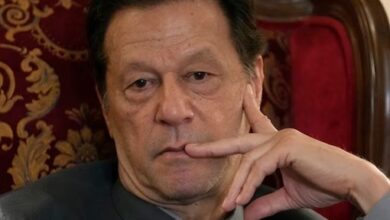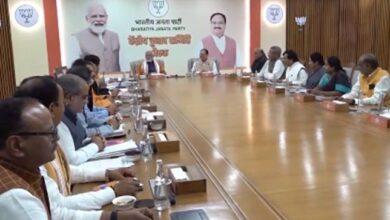“Jail Ke Jawab Mein Hum Vote Denge”: Following the AAP’s Rebuttal, the Election Body Accepts the Campaign Song Unaltered
Jail ke jawab mein hum vote denge, the campaign song for the Aam Aadmi Party (AAP), has now been authorized by the State Election Commission (SEC) without any changes. The party responded to the SEC’s objections to the song on April 30 after they had been made on April 27.

On April 25, the AAP released the song at the Delhi party headquarters in front of the party’s key officials. “With no modifications, we obtained a letter of permission for our campaign song on May 2. We have begun using the song,” said AAP Timarpur MLA and songwriter Dilip Pande.
The chief whip of Delhi, an AAP MLA, declared a moral win. We had opposed every point made by the ECI in our point-by-point reply, and we had not changed a word in our campaign song or accepted any of their suggestions. We refused to submit to the EC’s tanashahi. We refused to submit to the aims of the Bharatiya Janata Party (BJP). As a consequence, the BJP lost, democracy was preserved, and the truth triumphed. We have the chance to formally present the campaign song, which captures the feelings of the people of Delhi and the nation.
Speaking directly to the BJP, Pande said that the whole incident demonstrated the party’s “fear of defeat” in the current Lok Sabha elections. “Now that two election phases have passed, the BJP is aware that the ground is moving under its feet. But no party has descended to such a low in Indian political history in terms of abusing constitutional institutions.
The EC had made eight requests.
The EC objected to eight different lyrics and phrases in the AAP campaign song on May 27, claiming that they broke the rules set out by the ECI and Advertising Codes.
The sentence “jail ke jawab mein hum vote denge” was at the top of the list. The EC had said that this statement denigrated the judiciary, as did the violent crowd carrying the picture of Arvind Kejriwal in prison. According to the EC, the statement “tanashahi party ko hum chot denge” “apparently incited violence.” The statement “goondagardi ke khilaf hum vote denge” was the third point of contention. These words and a video that shows Manish Sisodia being led by the police, according to the chief election officer of Delhi, “tend to present the picture of police in bad taste.”
The state election commission stated that the lines “Awazein khilaf thi jo sabko jail mein daal dia, bas unko hi bahar rakha jisne unko maal dia/itna lalach, itna nafrat, bhrastachari se mohabbat” are slanderous and criticize the ruling party based on unverified facts, despite the fact that the AAP had not named a political party. “Tanashahi party ko hum chot denge with clip showing aggressive mob clapping with police shows criticism of the ruling party on the basis of unverified facts,” the state election commission had said.
The ECI had listed Rule-6, Programme Code (1), as one of the provisions broken. This code prohibits programming that could incite or encourage violence, interfere with the maintenance of law and order, support anti-national activity, or express opinions that compromise the independence of the judiciary and the president.
The electoral commission also cited Rule 7 (2) (iii), which prohibits advertisements that “glorify violence” or “tend to incite people to commit crimes.”
Additionally, it cited ECI rules Part B, paragraph 2.4 (d), which states that “incitement of violence” is not allowed when approving political commercials. The ECI rules’ Para 2.5 (d) was noted, stating that it is prohibited to criticize third parties or their employees based on unconfirmed claims or distortions.
The AAP was subsequently instructed to “modify the creative’s content in accordance with the Advertising Codes prescribed under the Cable Television Network Rules, 1994 and the ECI guidelines and norms” by the Delhi Election Commission.
AAP ANNOUNCES MORAL SUCCESS
Explaining the AAP’s response, Pande stated: “The EC said that the statement ‘jail ke jawab mein hum vote denge’ tarnished the judiciary’s credibility and threw doubt on it. What could be more democratic than using the voting box to react to politics? How is it a criticism of the legal system?
Pande questioned how the term “chot” could only be connected to violence, adding that the AAP had not mentioned any political parties in its election song and that harm could originate from anywhere, including the heart, mind, misgovernance, and goondagardi.
“Did they want to give a ruling that one should vote in favor of goondagardi from now on?” he said in response to the criticism of the phrase “goondagardi ke khilaf vote denge.” The brand ambassadors for the electoral commission speak the same lyrics as us in the song, don’t they?
Citing the Madukya Upanishad’s “satyameva jayate” and the late poet Ramdhari Singh Dinkar’s “jab nash manushya par chata hai, pehle vivek mar jata hai,” the AAP MLA said, “We had stated that these arguments were baseless and incorrectly presented when they first came up. We questioned the Delhi Election Commission’s objectivity and said that the results had shown that the EC was unintentionally linked to the BJP. In the end, what is false loses and the truth triumphs. This has been going on for a very long time.







